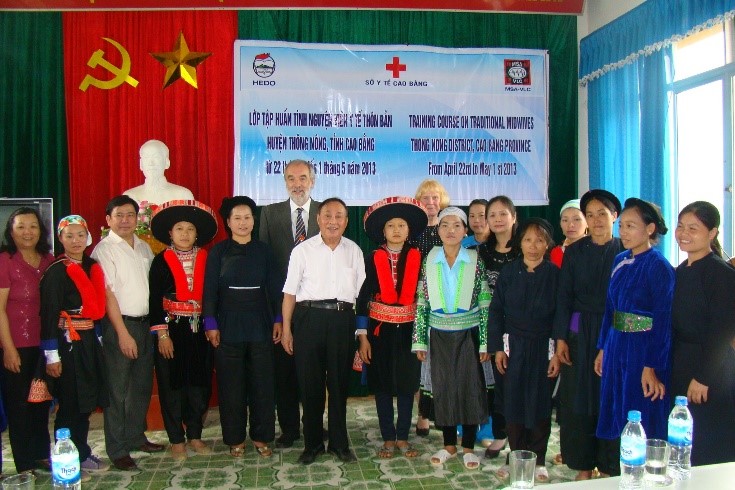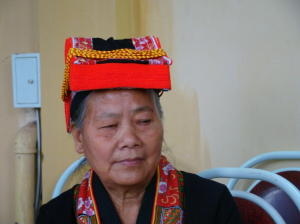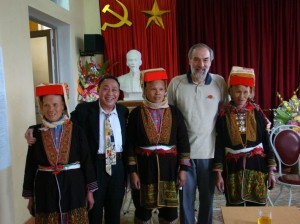Highland Education Development Organisation (HEDO) Traditional Midwife Training Courses
One of our on-going projects is the training of traditional midwives in the highland, ethnic minority villages of Vietnam. It is often not possible for expectant mothers to have their babies delivered at their local health clinic, and in many places it is the custom to have babies delivered at home, assisted by the traditional village ‘midwife’. These midwives’ skills are passed down to them from their mothers and older women, and although their help is invaluable, their knowledge is lacking. Antenatal and post-natal care is scarce and superstitions and ‘old-wives’ tales are rife. Even when expectant mothers want to have their babies delivered at a clinic, it may not be possible because the villages are many kilometres away and transport through the difficult mountainous terrain is uncertain, and sometimes unsafe.
In order to combat high rates of infant mortality the Highland Education Development Organisation has organised a series of training courses for these ‘traditional midwives’. Much of this training involves developing good practical skills in delivering babies safely at home, but it also encourages mothers to have their babies at their local clinic, whenever possible. The courses also include advice on antenatal and post-natal care, sex education, contraception, HIV, health and hygiene, and drug abuse. Mainly as a result of the midwives training the maternal and infant mortality rates in these districts has been considerably reduced.
Over the past ten years MSAVLC has funded a number of these training courses. The most recent being:
- Bao Lac District, Cao Bang Province: training course for 100 traditional midwives in March 2019
- Thach An District, Cao Bang Province: training course for 100 traditional midwives in September 2018
- Chiem Hoa District, Tuyen Quang Province: training course for 100 traditional midwives in April 2017
- Da Bac District, Hoa Binh Province: training course for 100 traditional midwives in February 2016
- Phong Tho District, Lai Chau Province: training course for 100 traditional midwives in April 2015
- Muong Cha District, Bien Dien Province: training course for 50 traditional midwives in Jan. 2015
- Nguyen Binh District, Cao Bang Province: training course for 100 traditional midwives in Jan. 2014
- Thong Nong District, Cao Bang Province: training course for 100 traditional midwives in April 2013
- Ha Quang District, Cao Bang Province: training course for 100 traditional midwives in January 2012
- Ba Be District, Bac Kan Province: training course for 100 traditional midwives in July 2011
- Than Uyen District, Lai Chau Province: training course for 100 traditional midwives in June 2010
- Chi Lang District, Lang Son Province: training course for 100 traditional midwives in May 2009
- Muong Te District, Dien Bien Province: training course for 100 traditional midwives in June 2008
- Mai Chau District, Hoa Binh Province: training course for 100 traditional midwives in March 2007
- Kim Boi District, Hoa Binh Province: training course for 100 traditional midwives in March 2005
- Cau Loc District, Lang Son Province: training course for 100 traditional midwives in February 2004
- Sa Pa District, Lao Cai Province: training course for 100 traditional midwives in February 2003
In 2013, two Trustees from MSAVLC visited the Northern Highlands to attend the opening of the Thong Nong Midwife Training Course in Cao Bang Province. They were also able to talk to some of the previously-trained midwives and see for themselves some of the difficulties faced by them.
“We left Hanoi heading north, and after a journey of about six hours, which seemed forever, we were able, over the next two days, to meet trained midwives from two highland provinces. We talked to the midwives about their work and problems that they had experienced since their training course. Not surprisingly, their main problem was the difficulty in travelling. They had all tried to persuade mothers to go to the clinics to have their babies, but this was often difficult to do. The mothers were too shy to attend the clinic, and liked to have their families and friends around them for the birth, as is their tradition. Also, because of the difficult terrain, some of the clinics were difficult to reach from their homes. Only 40% of households have toilets, the others using the countryside around them, so good hygiene practices were encouraged. The families usually live in houses built on stilts with their livestock living below, and the midwives tried to encourage them to move their buffalo and pigs away from the house. They were reluctant to do so, however, as they feared that they may be stolen, or eaten by wild animals! Tigers were mentioned, although there are no longer any tigers in Vietnam! They told us that they tried to teach the mothers about good nutrition; malnutrition is a problem in the highlands and many people are very poor.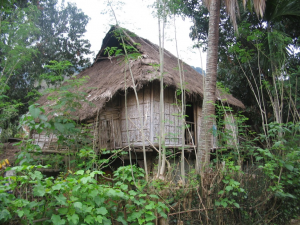
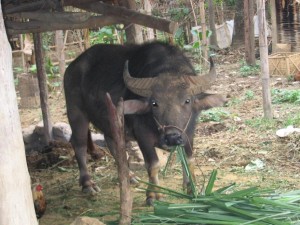 All the midwives that we met told us that the course had been invaluable to them, and all seemed confident and compassionate young women. One had walked 12 kilometres to meet us and it had taken her 3 hours to do so, in the heat of the day.”
“The opening ceremony for the 100 new midwives took place in a District Health Centre the next day, and we set off to it, passing fields of tobacco, sweet corn and rice, until the road degenerated into muddy rubble. It was very wet, with puddles lining the roads and fields. Then, again like yesterday, it became very steep as we climbed higher and higher and the road became narrow and winding. Again there were sheer drops, hundreds of feet with no crash barrier! I was terrified.
Many of the trainee midwives attended in their colourful, traditional costumes and were keen to start the course. Speeches were made and then we were entertained by some of the midwives with traditional-style songs. They sang songs about ‘population control’, ‘promotion of good health in the villages’, ‘their happiness to be partaking in the course’, ‘small families being richer families’, ‘family planning’, and ‘midwifery training’! There was even a song proclaiming that you should stop having children when you have two, and that two good girls are better than two naughty boys!
The ceremony lasted about one and a half hours and we bade our farewells to the midwives, leaving them sat at their desks, eager to start the course. We have never been more certain of the need for such courses, now appreciating the difficult terrain that everyone faces each day, and the great, almost impossible task, of getting to the clinics, especially during labour!”
All the midwives that we met told us that the course had been invaluable to them, and all seemed confident and compassionate young women. One had walked 12 kilometres to meet us and it had taken her 3 hours to do so, in the heat of the day.”
“The opening ceremony for the 100 new midwives took place in a District Health Centre the next day, and we set off to it, passing fields of tobacco, sweet corn and rice, until the road degenerated into muddy rubble. It was very wet, with puddles lining the roads and fields. Then, again like yesterday, it became very steep as we climbed higher and higher and the road became narrow and winding. Again there were sheer drops, hundreds of feet with no crash barrier! I was terrified.
Many of the trainee midwives attended in their colourful, traditional costumes and were keen to start the course. Speeches were made and then we were entertained by some of the midwives with traditional-style songs. They sang songs about ‘population control’, ‘promotion of good health in the villages’, ‘their happiness to be partaking in the course’, ‘small families being richer families’, ‘family planning’, and ‘midwifery training’! There was even a song proclaiming that you should stop having children when you have two, and that two good girls are better than two naughty boys!
The ceremony lasted about one and a half hours and we bade our farewells to the midwives, leaving them sat at their desks, eager to start the course. We have never been more certain of the need for such courses, now appreciating the difficult terrain that everyone faces each day, and the great, almost impossible task, of getting to the clinics, especially during labour!”
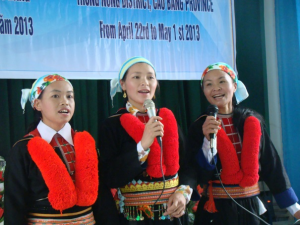
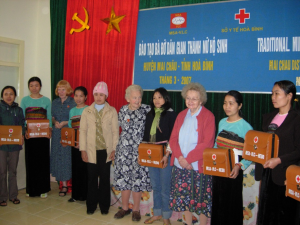
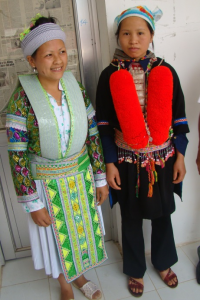
2015
In January 2015 HEDO organised a training course for 50 midwives in Muong Cha District, Dien Bien Province, in the remote Northern Highlands of Vietnam. 80% of the people in the district are from minority ethnic groups, mostly Hmong and Thai, and over half of the pregnant women give birth at home. The course was very successful in giving the midwives up-to date ideas and practices to take back to their village.
In April 2015 two Trustees attended the opening ceremony of a further midwife training course for 50 traditional midwives in Phong Tho District, Lai Chau Province. The trainees were recruited from a number of ethnic minorities, and all were keen to learn about modern midwifery practices.
Since the course, HEDO and Lai Chau Health Department requested that MSAVLC fund a further course to train 50 midwives in Phong Tho District, and this has was agreed by the Trustees.
2019
Since 2015 four more Midwives’ Training Courses have taken place in the highland ethnic minority districts of Vietnam, and many more traditional midwives have been trained in modern practices.
Regular financial reports, narrative reports and photographs for each course have been received and proved satisfactory. In June 2019 Prof. Trinh, the director of HEDO, visited England where he met with Trustees and was able to discuss the courses, and outline his plans for the future.
2020 – UPDATE
Due to the Covid 19 pandemic, Trustees were not able to visit the Highland Education Development Organisation (HEDO) this year as planned, and it has not been possible to continue with the training of midwives at present.
Sadly, Prof. Trinh Ngoc Trinh, the director of HEDO, died in December 2019 at the age of 85, after many years of devoted service to medical aid and education in the highlands of Vietnam.
